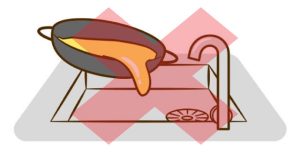Every kitchen sees its fair share of leftover cooking oil. While you might be tempted to simply pour it down the sink or flush it, here’s a reality check: it’s a bad idea. The incorrect disposal of oil doesn’t just jeopardize your plumbing but could also dig a deep hole in your pocket when it solidifies, causing blockages.
Understanding the Drain Issue
The drain might seem like an easy escape route for your used cooking oil, but it’s quite the opposite. As the oil cools within the pipelines, it turns into a gluey mess, sticking to the pipes. Over a period, this could result in blockages, leading to expensive plumbing bills. Moral of the story? Keep that oil away from the drain.
A Treat for the Birds
Wondering what you could possibly do with used oil? Here’s a delightful solution: make bird feed. Birds are quite fond of fatty foods, and used cooking oil is a hit. Here’s how to go about it:
Ingredients Assembly: Blend the leftover oil with ingredients like flour, oats, cereals, and seeds – anything that’s bird-friendly.
Shape Them: Fashion the mix into small, manageable balls.
Serve: Put these balls in a mesh bag or a suet cage and place them in your garden. It’s a treat birds can’t resist!
Thanks to this, you’re not just responsibly disposing of your oil but also catering to the local birds.
Image Source: Getty Images/iStockphoto
Dealing with Non-Solidifying Oil
There are instances when cooking oil remains liquid even after cooling. Pouring it directly might be problematic. Here’s what you can do:
Cool It Down: Let the oil cool naturally. Patience is key here.
Solidify or Contain: If it solidifies, directly throw it in the trash. If not, transfer it into a disposable container like an old milk carton, ensuring it’s sealed tight.
Trash it: Once securely contained, dispose of it in your regular garbage.
Oats as Saviors
You might have heard that oats can be used to absorb oil. It’s true for small spills. Sprinkling oats can help absorb the oil, making cleanup easier. For larger quantities, however, rely on the methods discussed above.
In essence, the way you dispose of cooking oil has larger implications, not just for your household plumbing but for the environment too. By being mindful and adopting these methods, you ensure a smoother kitchen experience and give back to nature in a unique way.
